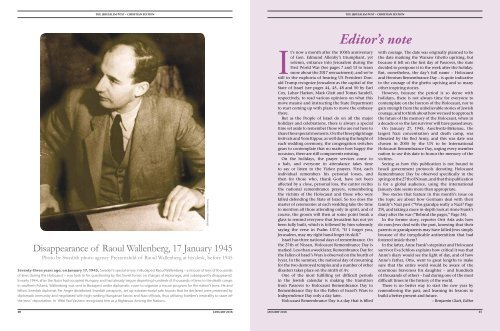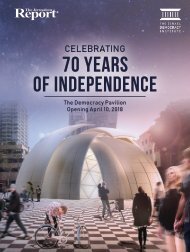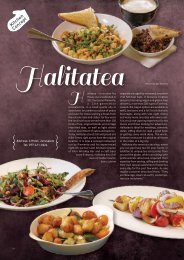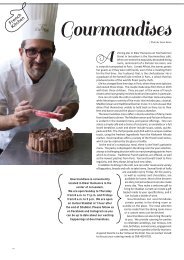CHE-_0_0_0_DoublePages+seg1
Create successful ePaper yourself
Turn your PDF publications into a flip-book with our unique Google optimized e-Paper software.
THE JERUSALEM POST • CHRISTIAN EDITION<br />
THE JERUSALEM POST • CHRISTIAN EDITION<br />
Disappearance of Raoul Wallenberg, 17 January 1945<br />
Photo by Swedish photo agency Pressensbild of Raoul Wallenberg at his desk, before 1945<br />
Seventy-three years ago, on January 17, 1945, Sweden’s special envoy in Budapest Raoul Wallenberg – a rescuer of tens of thousands<br />
of Jews during the Holocaust – was took in for questioning by the Soviet forces on charges of espionage, and subsequently disappeared.<br />
In early 1944, after the Nazis had occupied Hungary and had already begun deporting hundreds of thousands of Jews to the death camps<br />
in southern Poland, Wallenberg was sent to Budapest under diplomatic cover to organize a rescue program for the nation’s Jews. He and<br />
fellow Swedish diplomat Per Anger distributed Swedish passports, set up extraterritorial safe houses that he declared were protected by<br />
diplomatic immunity and negotiated with high-ranking Hungarian fascist and Nazi officials, thus utilizing Sweden’s neutrality to stave off<br />
the Jews’ deportation. In 1966 Yad Vashem recognized him as a Righteous Among the Nations.<br />
(Wikimedia Commons)<br />
It’s now a month after the 100th anniversary<br />
of Gen. Edmund Allenby’s triumphant, yet<br />
solemn, entrance into Jerusalem during the<br />
First World War (See pages 7 and 13 to learn<br />
more about the 2017 reenactment), and we’re<br />
still in the euphoria of hearing US President Donald<br />
Trump recognize Jerusalem as the capital of the<br />
State of Israel (see pages 44, 45, 48 and 50 by Earl<br />
Cox, Lahav Harkov, Mark Glatt and Tomas Sandell,<br />
respectively, to read various opinions on what this<br />
move means) and instructing the State Department<br />
to start coming up with plans to move the embassy<br />
there.<br />
But as the People of Israel do on all the major<br />
holidays and celebrations, there is always a special<br />
time set aside to remember those who are not here to<br />
share these special moments. On the three pilgrimage<br />
festivals and Yom Kippur, as well during the height of<br />
each wedding ceremony, the congregation switches<br />
gears to contemplate that no matter how happy the<br />
occasion, there are still components missing.<br />
On the holidays, the prayer services come to<br />
a halt, and everyone in attendance takes time<br />
to say or listen to the Yizkor prayers. First, each<br />
individual remembers his personal losses, and<br />
then for those who, thank God, have not been<br />
affected by a close, personal loss, the cantor recites<br />
the national remembrance prayers, remembering<br />
the victims of the Holocaust and those who were<br />
killed defending the State of Israel. So too does the<br />
master of ceremonies at each wedding take the time<br />
to mention all those attending only in spirit, and of<br />
course, the groom will then at some point break a<br />
glass to remind everyone that Jerusalem has not yet<br />
been fully built, which is followed by him solemnly<br />
saying the verse in Psalm 137:5, “If I forget you,<br />
Jerusalem, may my right hand forget its skill.”<br />
Israel has three national days of remembrance. On<br />
the 27th of Nissan, Holocaust Remembrance Day is<br />
marked. Less than a week later, Remembrance Day for<br />
the Fallen of Israel’s Wars is observed on the fourth of<br />
Iyyar. In the summer, the national day of mourning<br />
for the two destroyed temples and a number of other<br />
disasters takes place on the ninth of Av.<br />
One of the most fulfilling yet difficult periods<br />
in the Jewish calendar is making the transition<br />
from Passover to Holocaust Remembrance Day to<br />
Remembrance Day for the Fallen of Israel’s Wars to<br />
Independence Day only a day later.<br />
Holocaust Remembrance Day is a day that is filled<br />
Editor’s note<br />
with courage. The date was originally planned to be<br />
the date marking the Warsaw Ghetto uprising, but<br />
because it fell on the first day of Passover, the state<br />
decided to postpone it to the week after the holiday.<br />
But, nonetheless, the day’s full name – Holocaust<br />
and Heroism Remembrance Day – is quite indicative<br />
to the courage of the ghetto uprising and so many<br />
other inspiring stories.<br />
However, because the period is so dense with<br />
holidays, there is not always time for everyone to<br />
contemplate on the horrors of the Holocaust, nor to<br />
gain strength from the unbelievable stories of Jewish<br />
courage, and to think about how we need to approach<br />
the future of the memory of the Holocaust, when in<br />
a decade or so the last survivor will have passed away.<br />
On January 27, 1945, Auschwitz-Birkenau, the<br />
largest Nazi concentration and death camp, was<br />
liberated by the Red Army, and this was date was<br />
chosen in 2005 by the UN to be International<br />
Holocaust Remembrance Day, urging every member<br />
nation to use this date to honor the memory of the<br />
victims.<br />
Seeing as how this publication is not bound to<br />
Israeli government protocols denoting Holocaust<br />
Remembrance Day be observed specifically in the<br />
spring on the 27th of Nissan, and that this publication<br />
is for a global audience, using the international<br />
January date seems more than appropriate.<br />
Two stories that feature in this month’s issue on<br />
the topic are about how Germans deal with their<br />
family’s Nazi past (“Was grandpa really a Nazi? Page<br />
29), and taking a more in-depth look at Anne Frank’s<br />
diary after the war (“Behind the pages,” Page 34).<br />
In the former story, reporter Orit Arfa asks how<br />
do non-Jews deal with the past, knowing that their<br />
parents or grandparents may have killed Jews simply<br />
because of the inexplicable antisemitism that had<br />
fostered inside them?<br />
In the latter, Anne Frank’s stepsister and Holocaust<br />
survivor Eva Schloss explains how critical it was that<br />
Anne’s diary would see the light of day, and of how<br />
Anne’s father, Otto, went to great lengths to make<br />
sure that the entire world would be aware of the<br />
enormous braveness his daughter – and hundreds<br />
of thousands of others – had during one of the most<br />
difficult times in the history of the world.<br />
There is no better way to start the new year by<br />
remembering the past, and learning its lessons to<br />
build a better present and future. <br />
<br />
– Benjamin Glatt, Editor<br />
10 JANUARY 2018<br />
JANUARY 2018 11
















